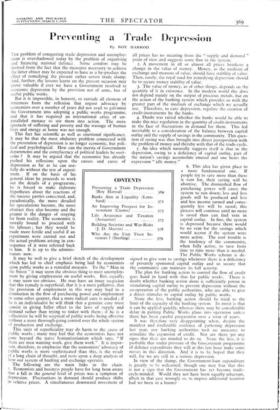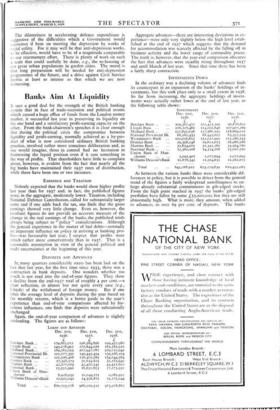Preventing a Trade Depression
By ROY HARROD
THE problem of conquering trade depression and unemploy- ment is overshadowed today by the problem of organising and financing national defence. Some comfort may be derived from the fact that the measures necessary to achieve the latter object may be expected to have as a by-product the effect of remedying the present rather severe trade slump. And, further, the lessons learnt on the present occasion may prove valuable if ever we have a Government resolved to overcome depression by the provision not of arms, but of useful public works.
But it is impossible, in honesty, to extrude all element of bitterness from the reflexion that urgent advocacy by economists over a number of years did not avail to galvanise the Government into adopting a public works programme, and that it has required an international crisis of un- paralleled menace to stir them into action. The mere spectacle of suffering and poverty and the wastage of human lives and energy at home was not enough.
This fact has scientific as well as emotional significance. It may be that the most obdurate problem connected with the prevention of depression is no longer economic, but poli- tical and psychological. How can the inertia of Government departments and the complacency of political leaders be over- come ? It may be argued that the economist has already pushed his reflexions upon the causes and of depression as far as he can use- fully do without the test of experi- ment. If on the basis of his general ideas he proceeds to work out the details of a programme, he is forced to make elaborate hypotheses about the reactions of the various parties concerned, and, paradoxically, the more detailed his speculations become, the more abstract they also become and the greater is the danger of straying far from reality. The economist is morally bound to proceed with his labours ; but they would be made more fertile and useful if an experiment were carried out and the actual problems arising in con- sequence of it were referred back to him. It is up to the adminis- trators now.
It may be well to give a brief sketch of the development which has led to chief emphasis being laid by economists upon public works as a remedial measure. To the " Man in the Street " it may seem the obvious thing to meet unemploy- ment by giving employment on useful works. But, equally, it may seem too obvious. He may have an inner suspicion that this remedy is superficial, that it is a mere palliative, that the provision of employment in this way may lead to a diminution in the flow of purchasing power and employment in some other quarter, that a more radical cure is needed ; if he is an individualist he will think that a genuine cure must consist in giving fuller effect to the laws of supply and .demand rather than trying to tinker with them ; if he is a collectivist he will be sceptical of public works being effective without a more thorough-going control over the whole system of production and exchange.
This taint of superficiality may do harm to the cause of public works ; many may feel that the economists have not gone beyond the naïve humanitarianism which says, " If there are men wanting work, give them work." It is impor- tant, therefore, to emphasise that the economists' advocacy of public works is more sophisticated than this, is the result of a long chain of thought, and rests upon a deep analysis of how our system of banking and exchange operates.
The following are the main links in the chain. I I. Economists and business people have for long been aware that a fall in the general level of prices was a symptom of depression. Fluctuations in demand should produce shifts in relative prices. A simultaneous downward movement of all prices has no meaning from the " supply and demand " point of view and suggests some flaw in the system.
2. A movement in all or almost all prices betokens a change in the value of money. Money, as the medium of exchange and measure of value, should have stability of value. Then, surely, the royal road for remedying depression should be to secure money stability of value.
3. The value of money, as of other things, depends on the quantity of it in existence. In the modern world this does not depend mainly on the output of precious metals, but on the action of the banking system which provides us with the greater part of the medium of exchange which we actually use. Therefore, to cure depression, regulate the creation of credit-instruments by the banks.
4. Doubt was raised whether the banks would be able to make this nice regulation in the quantity of credit-instruments in the face of fluctuations in demand for them. This led inevitably to a consideration of the balance between capital outlay and the supply of savings in the community. This ques- tion of saving was thus brought into direct juxtaposition with the problem of money and thereby with that of the trade-cycle.
5. An idea which naturally suggests itself is that in the depression, owing to a deficiency of capital outlay, part of the nation's savings accumulate unused and one hears the cures expression " idle money." 6. This idea has given place to a more fundamental one. If people try to save more than there is vent for, their saving will be abortive. The diminished flow of purchasing power will cause the system to run down; less and less goods will be produced and less and less income earned and conse- quently less will be saved; this process will continue until no more is saved than can find vent in capital outlay. In fine, the system is depressed because there would be no vent for the savings which would accrue if the system were more active. The root trouble is the tendency of the community, when fully active, to save from time to time more than is needed. The Public Works scheme is de- signed to give vent to savings whenever there is a deficiency of privately sponsored capital outlay and so secure that the community can maintain its full activity.
The plan for banking action to control the flow of credit goes hand in hand with that for public works. There is doubt whether banking action alone is sufficiently potent in stimulating capital outlay to prevent depression without the co-operation of the public authorities, who are able to give a direct stimulus to capital outlay by public works.
None the less, banking action should be tried to the limit of the capacity of the banking system. Its merit is that it can be applied quickly, whereas there may be considerable delay in putting Public Works plans into operation unless there has been careful preparation over a term of years.
It was therefore very disappointing when, despite the manifest and irrefutable evidence of gathering depression last year, our barking authorities took no measures to stimulate the expansion of credit. Nor are there yet any signs that they are minded to do so. None the less, it is probable that under pressure of the Government programme of defence expenditure they will at this late hour make some moves in this direction. And it is to be hoped that they will, for we are still in a serious depression.
In view of the slump, the Government-loan expenditure is greatly to be welcomed, though one may fear that this is not a sign that the Government has yet become trade- cycle-minded. Would they not have been equally reluctant, albeit in that case wrongly so, to impose additional taxation had we been in a boom? The dilatoriness in accelerating defence expenditure is suggestive of the difficulties which a Government would encounter if bent on meeting the depression by works of social utility. For it may well be that anti-depression works, to be effective, would have to be of a magnitude comparable to our rearmament effort. There is plenty of work on such a scale that could usefully be done, e.g., the re-housing of our great urban populations in garden cities. The moral is that long preparation will be needed for anti-depression programmes of the future, and a drive against Civil Service inertia at least as intense as that which we are now witnessing.



























































 Previous page
Previous page